The World War I Victory Medal was a United States service medal designed by James Earle Fraser of New York City under the direction of the Commission of Fine Arts.
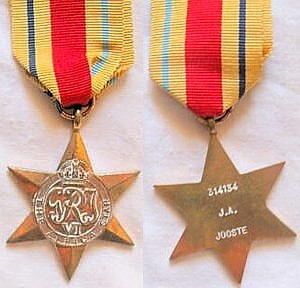
The Africa Star is a military campaign medal, instituted by the United Kingdom on 8 July 1943 for award to British and Commonwealth forces who served in North Africa between 10 June 1940 and 12 May 1943 during the Second World War.
A removable partial denture (RPD) is a denture for a partially edentulous patient who desires to have replacement teeth for functional or aesthetic reasons and who cannot have a bridge for any reason, such as a lack of required teeth to serve as support for a bridge or financial limitations.
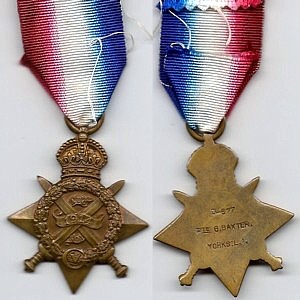
The 1914 Star, colloquially known as the Mons Star, is a British World War I campaign medal for service in France or Belgium between 5 August and 22 November 1914.

The 1939–1945 Star is a military campaign medal instituted by the United Kingdom on 8 July 1943 for award to British and Commonwealth forces for service in the Second World War. Two clasps were instituted to be worn on the medal ribbon, Battle of Britain and Bomber Command.
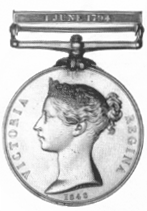
The Naval General Service Medal (NGSM) was a campaign medal approved in 1847, and issued to officers and men of the Royal Navy in 1849. The final date for submitting claims was 1 May 1851. Admiral Thomas Bladen Capel was one of the members of the board that authorised the medal.

The Military General Service Medal (MGSM) was a campaign medal approved in 1847 and issued to officers and men of the British Army in 1848.

The Crimea Medal was a campaign medal approved on 15 December 1854, for issue to officers and men of British units which fought in the Crimean War of 1854–56 against Russia. The medal was awarded with the British version of the Turkish Crimea Medal, but when a consignment of these was lost at sea, some troops received the Sardinian version.

The Gulf War Medal was a campaign medal approved in 1992, for issue to officers and men of British forces who served in Kuwait and Saudi Arabia during Operation Granby in 1990–91.
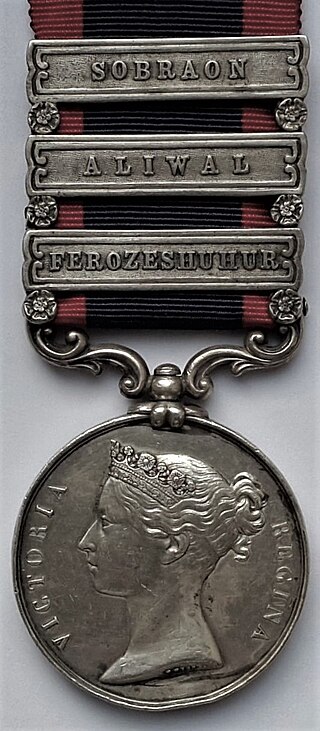
The Sutlej Medal was a campaign medal approved in 1846, for issue to officers and men of the British Army and Honourable East India Company who served in the Sutlej campaign of 1845–46. This medal was the first to use clasps to denote soldiers who fought in the major battles of the campaign.

The Emergency Reserve Decoration (ERD) was a British military decoration for long service, instituted on 17 November 1952 and given for service up to 1967.

A medal bar or medal clasp is a thin metal bar attached to the ribbon of a military decoration, civil decoration, or other medal. It most commonly indicates the campaign or operation the recipient received the award for, and multiple bars on the same medal are used to indicate that the recipient has met the criteria for receiving the medal in multiple theatres.
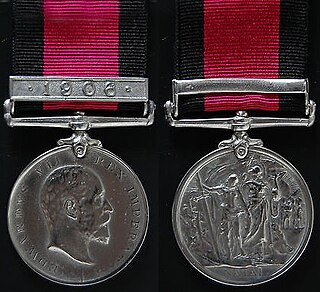
The Natal Native Rebellion Medal was a British campaign medal. It was authorised in 1907 for service in Natal during a Zulu revolt against British rule and taxation in 1906. The 1906 Clasp to the medal was awarded to those who had served for more than fifty days.

The British South Africa Company Medal (1890–97). In 1896, Queen Victoria sanctioned the issue by the British South Africa Company of a medal to troops who had been engaged in the First Matabele War. In 1897, the award was extended to those engaged in the two campaigns of the Second Matabele War, namely Rhodesia (1896) and Mashonaland (1897). The three medals are the same except for name of the campaign for which the medal was issued, inscribed on the reverse.

The East and Central Africa Medal, established in February 1899, was a British campaign medal awarded for minor military operations in the Uganda Protectorate and Southern Sudan between 1897 and 1899. Four separate clasps were issued.
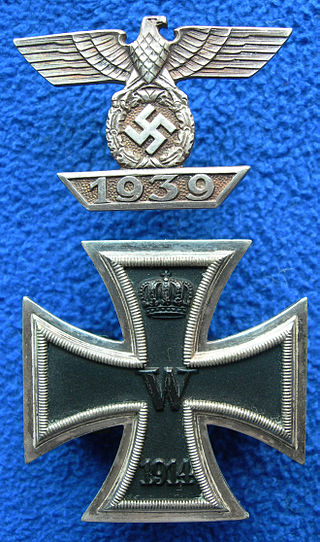
The Clasp to the Iron Cross was a white metal medal clasp displayed on the uniforms of German Wehrmacht personnel who had been awarded the Iron Cross in World War I, and who again qualified for the decoration in World War II.

The Africa General Service Medal, established in 1902, was a campaign medal of the United Kingdom. It was awarded for minor campaigns that took place in tropical Africa between 1900 and 1956, with a total of forty five clasps issued. The medal is never seen without a clasp and some are very rare. Most medals were granted to British led local forces, including the King's African Rifles and the West African Frontier Force. The only campaigns where European troops were present in any numbers were the various Somaliland campaigns,, and in Kenya.

The Special Constabulary Long Service Medal is a long service medal awarded in the United Kingdom to members of the Special Constabulary who have completed a specified period of service. Established in 1919 by King George V, the medal was initially created to reward members of the Special Constabulary for their service during World War I.
Doireann Ní Ghríofa is an Irish poet and essayist who writes in both Irish and English.
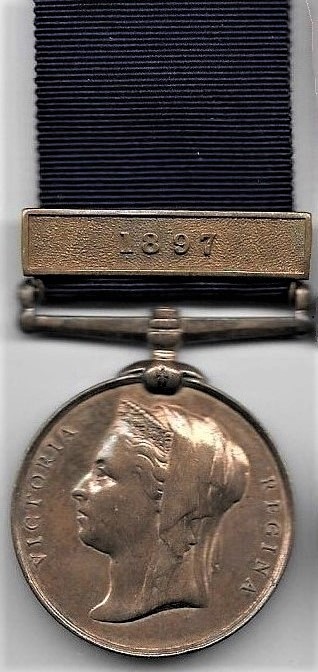
A Police Jubilee Medal was awarded to those on duty at Queen Victoria's Golden and Diamond Jubilee celebrations.
This page is based on this
Wikipedia article Text is available under the
CC BY-SA 4.0 license; additional terms may apply.
Images, videos and audio are available under their respective licenses.


















